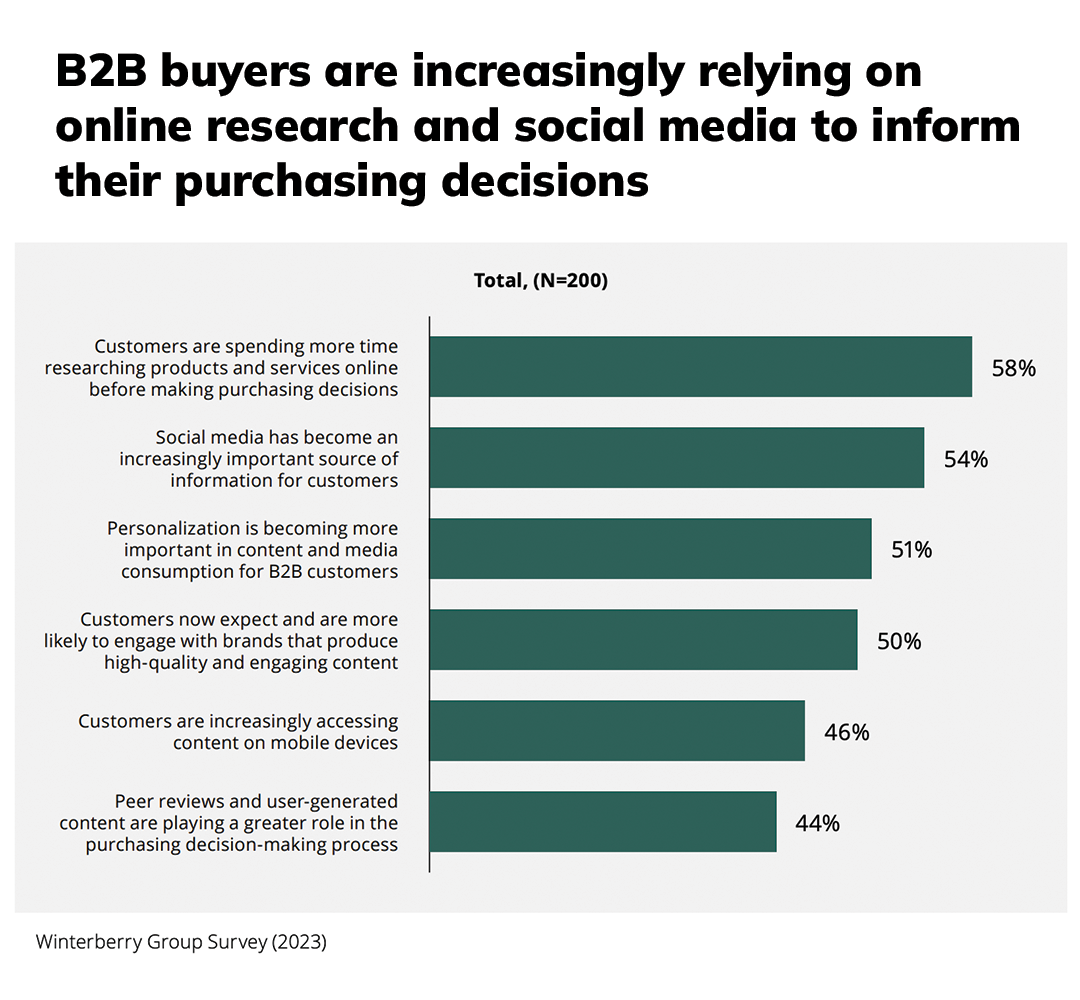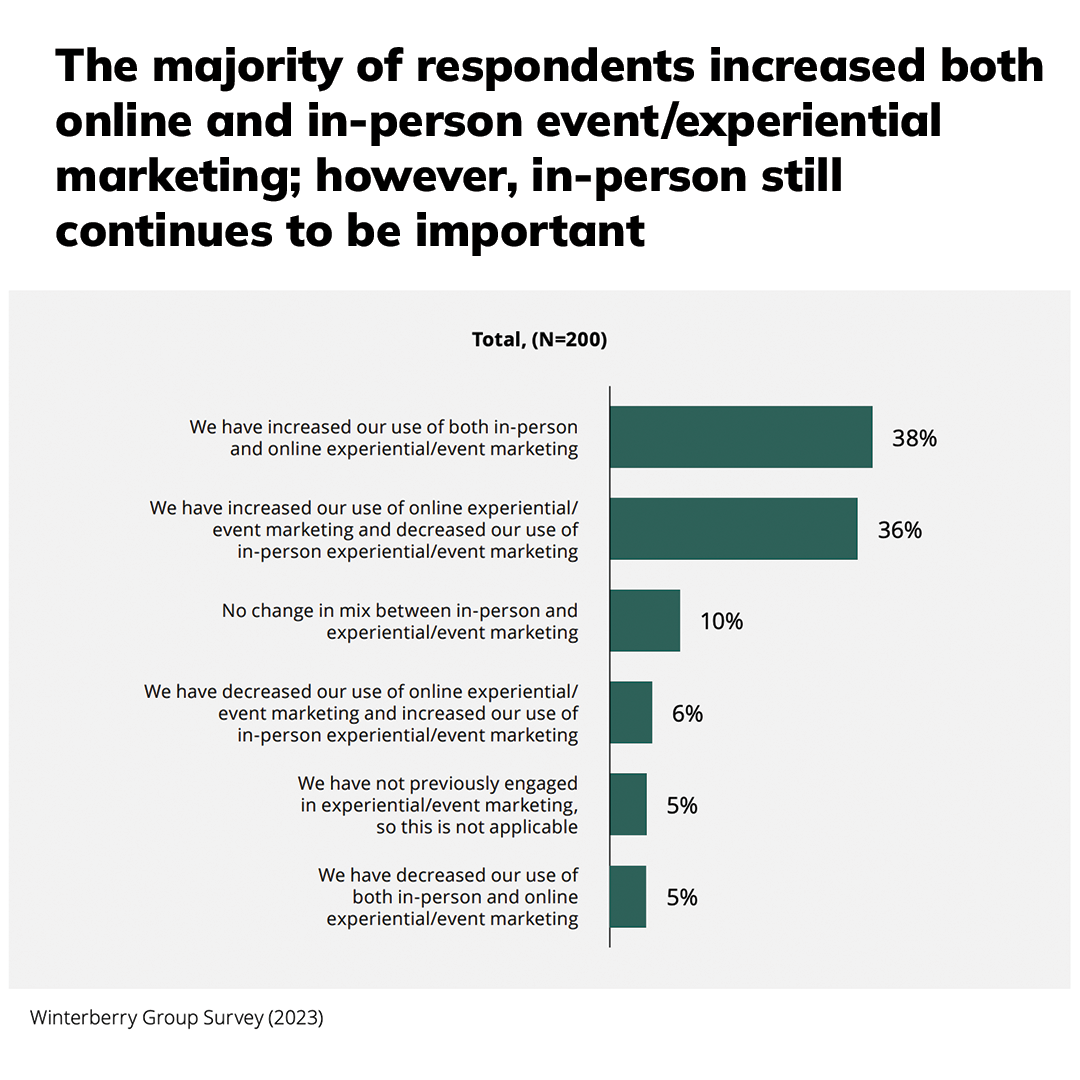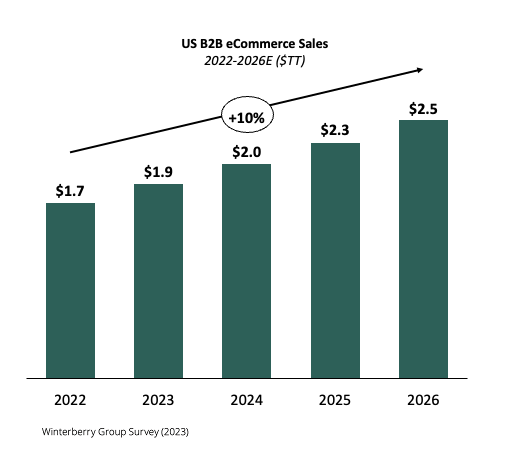
Consumerization of B2B marketing: What it is and why it’s important

The B2B marketing landscape is undergoing a significant transformation. From the way where we reach our customers to how they make purchase decisions, everything we B2B marketers do is evolving because B2B buyers are bringing their consumer buying behaviors to work.
We recently partnered with the Winterberry Group to dive into what’s driving this transformation and how B2B marketers are responding.
What is the consumerization of B2B?
B2B buyers are increasingly relying on online research, social media, and peer communities to inform their shortlists and final purchase decisions, mimicking how they use these channels when they are buying a car, a TV, or a house. While sales calls and booth chats were once the primary information channels, today’s buyers are using social media and review sites for peer insights and opinions long before they want to engage with you as the seller. Consumerization also extends to expectations around the buying experience and product experience, B2B buyers compare websites, advertising, product onboarding and utilizationse, customer service to the best companies they engage with around the clock; your competition in this experience may not be your direct competition but rather Apple, Amazon, and Nordstrom.
Consumerization and B2B marketing
This rapid spread of consumerization stems from how we started working and making purchase decisions during the COVID-19 pandemic. Shifting to virtual and hybrid models for media consumption, experiences, and buying made a lasting impact on decision- making for B2B buyers.
One of the key drivers of this shift is the emergence of digital natives in decision-making roles. As Millennials take over leadership positions, they are leading the way in seeking a more personalized, convenient, and engaging buying experience.
Your buyers now seamlessly move between online and offline engagements and are more likely to remember and connect with brands that produce high-quality content in multiple media, particularly video. All that time spent streaming Succession and Ted Lasso does not mean your buyer is tired of watching videos; in fact, they are leaning more on video content as part of their learning and discovery.
Understanding the New Buyer Journey
Learn more about the changing landscape and get takeaways on how you can get in front of your competition. Check out the recorded webinar Understanding the New Buyer Journey from eMarketer.
Digital channels are king
Online research and social media have become indispensable tools for buyers as they make purchasing decisions.
58% of marketers say their customers are spending more time researching products and services online before making purchasing decisions. With this in mind, it’s important to focus on giving your prospective customers comprehensive and easily accessible online resources to meet the growing demand for information during the buying process.

Social media platforms, particularly LinkedIn, offer an interactive and dynamic environment where B2B buyers can explore products, engage with brands, and seek recommendations from their peers; in fact,. 54% of marketers reported that social media has become an increasingly important source of information for customers. By establishing a strong social media presence and leveraging these platforms to share valuable content and engage with your audience, you’re more likely to resonate with today’s B2B buyers and establish your company as a trusted industry authority.
Personalization is expected
Just like for B2C customers, personalization has become more important to B2B customers. Marketers have recognized this shift, with 51% of them acknowledging the growing importance of personalization in the B2B space. Buyers now expect tailored experiences that cater to their unique needs and preferences.
It’s important to realize that the individuals in your audience are more than just their job titles, and just like in their personal lives, they expect businesses to engage with them in personalized, convenient, and relevant ways. When you’re starting to incorporate personalization, try using a small pilot audience—for example, an ABM list of engaged prospects. This will help you test your process and see what type of personalization resonates most with your prospects. Then you can scale personalization to larger audiences once you’ve found what tactics work best.
Hybrid and virtual events are here to stay
Will virtual and hybrid events go away as we get further and further from the pandemic? The answer is clear: they aren’t going anywhere.
Hybrid is the new expectation. Only 6% of B2B marketers reported that they decreased their use of online experiential/event marketing and increased their use of in-person experiential/event marketing while over a third of marketers reported they either increased both in-person and online events or increased their use of online event marketing and decreased their in-person efforts.

Even as in-person events return, virtual experiences will continue to play a significant role (not everyone is excited about putting on ‘hard pants’!). This combination of virtual and in-person engagements allows businesses to reach a wider audience and give them more diverse and accessible experiences.
B2B eCommerce is expanding
Another large change brought about by consumerization is the expansion of B2B eCommerce. Just as direct-to-consumer commerce succeeded online, we’re seeing similar patterns unfolding in B2B.
While not all purchasing processes will move entirely online, there will be a noticeable shift toward online channels. Lower-consideration products may see the entire purchasing process taking place online, while higher-consideration products may involve a hybrid approach with both online and offline engagements.

Looking forward
The consumerization of B2B marketing is not a passing trend; it represents a fundamental shift in how businesses engage with their customers. In response to these transformations, you should adapt your strategies and shift your investments to meet buyers where they are: social, video, peer review sites, and communities, at hybrid events. Build more personalization (but be careful you don’t get creepy) into your programs and experiences and explore new channels and formats. Now is the time to experiment and learn.
.png?width=290&name=MicrosoftTeams-image%20(29).png)
